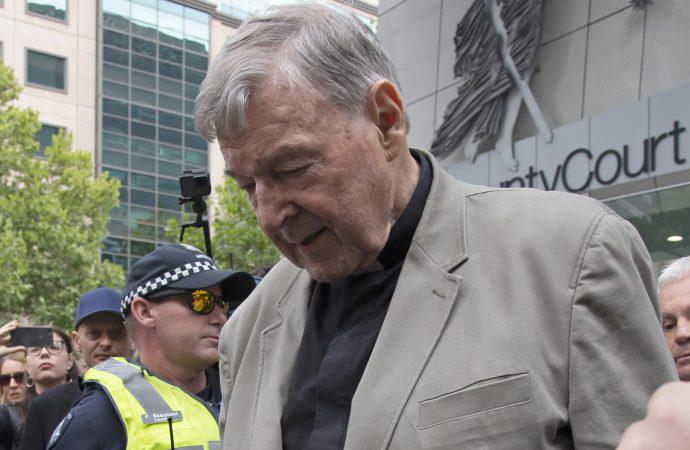|
Vatican contrast on Pell, McCarrick driven by doubt about guilt
By John L. Allen Jr.
Like virtually everyone in Catholic circles, the Vatican has known since December about Cardinal George Pell’s conviction in his native Australia for alleged sexual offenses against two minor boys in 1996. As a result, Rome was not at all caught off guard when news of the conviction made the rounds Tuesday, after a gag order was lifted. The statement read aloud to reporters Tuesday by Vatican spokesman Alessandro Gisotti was not, therefore, cobbled together under tight deadline pressure. On the contrary, officials had three months to ponder what they wanted to say when the moment came. That truth makes it all the more striking how little the statement actually said - no word about any Church trial of Pell, nothing about taking away his cardinal’s red hat or expelling him from the Catholic priesthood, all of which happened to Theodore McCarrick of the United States in what, in Church terms, was the mere blink of an eye. How does one explain the difference? It’s actually fairly simple: Early on, senior officials were convinced of McCarrick’s guilt. With Pell, they still aren’t. Over the last couple of days, Crux has spoken with some of the Catholic Church’s leading reformers on clerical sexual abuse, inside the Vatican and out. To be clear, these are not people automatically inclined to give accused clergy the benefit of the doubt, and several are figures who actually dislike some of Pell’s political and theological stances as well as what’s often see as his fairly bruising personality. Nonetheless, they’ve expressed skepticism that Pell is actually guilty of the crimes with which he was charged and convicted. The irony is that the people in the Vatican most inclined to welcome Pell’s conviction aren’t really reformers on sexual abuse, but those lukewarm about house-cleaning on the financial front who resented Pell’s challenge to the status quo during his brief tenure as the Vatican’s financial czar. For those wondering about Pell’s guilt, their ambivalence isn’t rooted exclusively in the generic belief that Pell wouldn’t do it, although many who know the 77-year-old prelate find it hard to swallow. On the other hand, reformers are also well aware that operating on gut instinct and solidarity with fellow clerics is a good part of what got the Church into trouble in the first place, and that experience has shown every accusation has to be taken seriously. Instead, the doubts are based on the allegations themselves, which require one to believe that an archbishop known as a fusspot for liturgical rules inexplicably broke protocol to head for the sacristy behind the cathedral altar on a busy Sunday. Normally accompanied by aides but at that moment strangely alone, according to the charge, Pell then discovered two choirboys, also by themselves, sexually abused both boys while still wearing his cumbersome liturgical vestments (which cannot be parted in the ways described in the testimony), and then returned to greeting Mass-goers, all without ever being observed by the host of people who constantly move in and out of the sacristy on such an occasion. As Australian Jesuit Father Frank Brennan, who attended the trial, has written, “The proposition that the offenses charged were committed immediately after Mass by a fully robed archbishop in the sacristy with an open door and in full view from the corridor seemed incredible to my mind.” Further, Pell’s conviction came in a second trial after his first trial in August ended with a hung jury. Ten of those twelve jurors were ready to acquit, leaving people to wonder about how such a dramatic swing was possible from one trial to the next. There’s also the politics of Australia to consider, where, due to negative media coverage and his own combative disposition, Pell occupies roughly the same spot in public opinion as Osama bin Laden did in the United States post-9/11. (Yes, that’s an exaggeration, but only slightly.) For some, there are questions about whether a fair trial was really possible. This background helps explain why the statement on Tuesday was relatively non-committal, saying only that the Vatican would await the results of an appeal while “recalling that Cardinal Pell has confirmed his innocence and has the right to defend himself to the last stage of appeal.” The statement did indicate that the normal restrictions imposed on clergy accused of abuse, including suspension from public ministry and any contact with minors, remain in force. Gisotti also confirmed later in the day that Pell’s term as Secretary of the Economy had expired, and while neither of those points amount to throwing Pell under the bus, they’re not exactly a ringing endorsement either. If Pell’s conviction is upheld and convincing evidence emerges that solidifies belief in his guilt, he’ll no doubt face the same fate as McCarrick, and the Vatican will face the same hard questions about who knew what and when. Pope Francis was compelled to promise a thorough review of the Vatican’s archives on McCarrick, and he’d almost certainly have to do the same thing on Pell. In the minds of many of the people responsible for such decisions, however, that moment has not yet come with George Pell - and therein lies the difference between two cases which, otherwise, may seem remarkably similar.
|
.
Any original material on these pages is copyright © BishopAccountability.org 2004. Reproduce freely with attribution.
